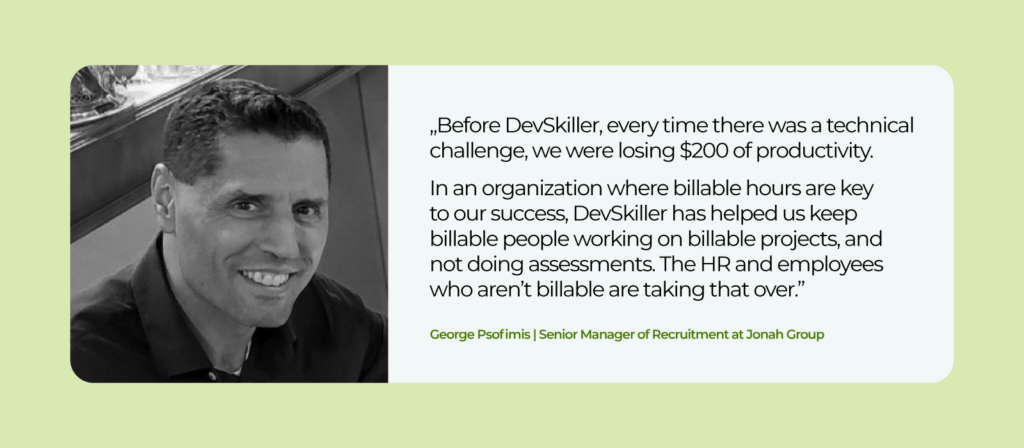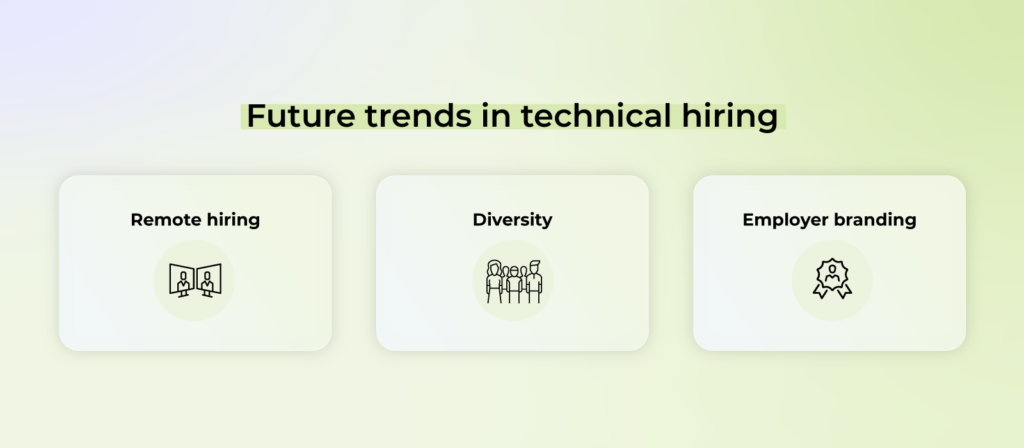
Modern approaches to technical hiring

In recent years, the landscape of technical hiring has experienced profound changes.
The emergence of innovative technologies, coupled with evolving market dynamics, has prompted organizations to perpetually search for and implement effective strategies aimed at attracting and retaining top-tier technical talent.
This ongoing quest is driven by the recognition that skilled technical professionals are integral to maintaining a competitive edge in a rapidly changing technological environment. Consequently, companies are exploring diverse and dynamic approaches to ensure they secure the most capable individuals in the top tech recruiting industry.
In this article, we’re going to delve into the modern approaches to technical hiring that are shaping up the industry for tomorrow. Here’s what we’ll cover:
- The evolution of technical hiring
- Key strategies for successful technical hiring
- The role of social media in technical hiring
- Case studies: Jonah Group – A technology company building great software
- Common challenges in technical hiring
- Tips for interviewing technical candidates
- The importance of employer branding in attracting talent
- Integrating AI and machine learning in hiring processes
- Future trends in technical hiring
Let’s get started!
The evolution of technical hiring
Traditionally, the focus of technical hiring was predominantly on hard skills and technical proficiency.
However, contemporary hiring practices have shifted to place an equal emphasis on soft skills, cultural compatibility, and the potential for professional growth.
This holistic approach recognizes that while technical expertise is crucial, the ability to communicate effectively, adapt to organizational culture, and evolve with the industry are equally vital.
As a result, modern recruitment strategies in the tech sector now seek a well-rounded blend of technical acumen and interpersonal qualities, ensuring that new hires not only excel in their technical roles but also contribute positively to the broader organizational dynamics.
Key strategies for successful technical hiring
Emphasizing soft competências
Competências transversais such as communication, teamwork, and problem-solving are increasingly gaining prominence in technical roles.
Companies are now acknowledging the critical role these skills play in fostering innovation and collaboration.
In today’s fast-paced technological landscape, the ability to effectively communicate ideas, work harmoniously in diverse teams, and creatively solve complex problems is just as important as technical expertise.
This recognition has led to a shift in hiring practices, where attributes like emotional intelligence, adaptability, and collaborative skills are being weighed with equal importance to technical qualifications.
This holistic approach aims to build teams that are not only technically proficient but also adept at driving forward-thinking solutions and working cohesively in a dynamic environment.
Leveraging technology in recruitment
The integration of Artificial Intelligence (AI), machine learning, and data analytics into recruitment processes has significantly enhanced the efficiency of candidate screening and selection.
These advanced technologies enable a more precise matching of a candidate’s skills with the job requirements.
By leveraging AI and machine learning, recruiters can analyze a vast array of data points to identify candidates who not only possess the required technical skills but also align with the company’s cultural and soft skill prerequisites.
This results in a more streamlined and effective recruitment process, reducing the time and resources spent on finding the right candidate.
Furthermore, data analytics provides valuable insights into recruitment trends and patterns, allowing companies to refine their hiring strategies continuously for optimal outcomes.
Building an inclusive hiring process
An inclusive hiring process goes beyond mere compliance with legal standards; it plays a pivotal role in building diverse and innovative teams.
Such teams, enriched by a variety of perspectives, are better equipped to foster creativity and offer multifaceted solutions to complex problems.
Inclusivity in recruitment ensures representation from different backgrounds, experiences, and viewpoints, which is crucial for nurturing an environment of innovation and diverse thought.
This approach not only supports a positive workplace culture but also drives the organization towards broader and more versatile problem-solving capabilities, reflecting a commitment to diversity and equal opportunity in the workplace.
The role of social media in technical hiring
Social media platforms have emerged as vital tools in the recruitment process, enabling companies to access a broader pool of candidates and engage with them directly.
These platforms offer a unique avenue for organizations to showcase their culture, values, and opportunities, attracting potential applicants from various backgrounds and skill sets.

Through social media, recruiters can actively reach out to passive candidates who may not be actively seeking new opportunities but are open to compelling offers.
Additionally, social media allows for a more interactive and personal approach to recruitment, fostering a connection between the company and potential candidates early in the hiring process.
This approach not only expands the reach of recruitment efforts but also helps in building a more diverse and talented workforce.
Case studies: Jonah Group – A technology company building great software
Grupo Jonah, a technology company specializing in software development and business intelligence, prides itself on its team of experts and a remarkable 20-year track record of successful projects. A key to their success has been an unwavering focus on customer satisfaction.
However, Jonah Group faced several challenges that impacted their efficiency, particularly in their recruitment processes.
One of the major challenges was the high number of non-billable hours spent on candidate assessments. Developers had to manually grade these assessments, leading to significant productivity losses. Furthermore, scheduling assessments for candidates visiting their facility proved to be a logistical headache, causing delays and scheduling conflicts.
The overall process of assessing candidates was time-consuming, taking up to a week from scheduling to grading, which slowed down the hiring process. Additionally, due to concerns about plagiarism, their in-house assessment process did not allow internet access, restricting candidates’ ability to access necessary online resources.
George Psofimis, the Senior Manager of Recruitment at Jonah Group, described the process as “archaic,” akin to coding with pen and paper.

To address these challenges, Jonah Group implemented DevSkiller, a move that led to significant improvements and cost savings. With DevSkiller, the company saved $200 on every candidate assessment, a figure that accounted for productivity gains and time saved in report writing.
The automated system not only provided financial benefits but also streamlined the assessment process.
Candidates were given three days to complete tasks, which were then automatically graded, reducing the assessment duration from 5-7 days to 3-5 days.
The introduction of DevSkiller also improved the candidate disposition process. Candidates received prompt invitations to complete assessments, leading to higher completion rates and speeding up the hiring process.
The use of Integrated Development Environments (IDEs) in DevSkiller reduced the number of candidates timing out, and customizing test settings improved the candidate experience. As a result, more candidates completed their assessments.
Candidates appreciated the convenience and accessibility of the TalentScore feature in DevSkiller, enhancing their overall experience.
Jonah Group not only managed to increase their billable hours but also shortened the time required to process candidates by 33%, screening about 100 candidates per quarter.
George Psofimis emphasized the impact of DevSkiller, noting, “Before DevSkiller, every time there was a technical challenge, we were losing $200 of productivity.
In an organization where billable hours are key to our success, DevSkiller has helped us keep billable people working on billable projects, and not doing assessments. The HR and employees who aren’t billable are taking that over.”
This strategic shift in their recruitment process underscores Jonah Group’s commitment to maintaining efficiency while seeking the best technical talent in the industry.
Common challenges in technical hiring
Finding the right talent
One of the most significant challenges in recruitment is identifying candidates who possess the right blend of skills and experience.
This difficulty arises from the ever-evolving nature of job roles, particularly in fields driven by technological advancements and changing market trends.
Employers are often in search of individuals who not only have the technical expertise necessary for the role but also exhibit a range of soft skills, adaptability, and cultural fit.
Finding such well-rounded candidates requires a thorough and strategic approach to the recruitment process.
Recruiters must navigate a complex landscape to ensure that the individuals they select can effectively contribute to and grow within the organization, aligning with its long-term goals and values.
Balancing speed and quality in hiring
Companies frequently face the challenging task of balancing the urgency to fill vacant positions with the necessity of finding candidates who are the best fit for the role.
This dilemma stems from the pressure to quickly address workforce gaps to maintain productivity and meet business objectives. However, hastening the recruitment process can sometimes lead to compromises in the quality of hires.

On the other hand, taking the time to meticulously search for and vet candidates who not only have the required skills but also align with the company’s culture and values ensures long-term benefits.
Striking this balance is critical for businesses to build a competent, cohesive, and committed team that contributes to sustained organizational success.
Tips for interviewing technical candidates
Structuring effective technical interviews
Effective interviews are crucial in assessing both the technical skills and the cultural fit of candidates. These interviews must delve into the technical competencies required for the role, evaluating the candidate’s expertise, problem-solving abilities, and technical knowledge.
Equally important is gauging how well the candidate aligns with the company’s culture, values, and work environment. This includes understanding their approach to teamwork, communication, and adaptability.
Balancing these aspects in an interview ensures that the selected candidates are not only capable of performing their job functions effectively but also contribute positively to the overall workplace dynamic, fostering a healthy and productive organizational culture.
Assessing technical skills
Interviews should incorporate practical assessments to accurately evaluate a candidate’s technical abilities. These assessments provide a tangible measure of a candidate’s proficiency in specific skills relevant to the job role.
By engaging in real-world scenarios or problem-solving exercises, candidates can demonstrate their technical expertise, critical thinking, and approach to challenges.
This hands-on evaluation complements the traditional interview questions, offering a more comprehensive view of the candidate’s capabilities.
Such practical assessments are invaluable in the technical hiring assessments and ensuring that the chosen candidates truly possess the skills necessary to excel in their roles and contribute effectively to the organization’s objectives.
The importance of employer branding in attracting talent
A strong employer brand is essential in attracting top talent. It encompasses effectively showcasing the company’s culture, values, and opportunities for growth and development.
This brand image plays a pivotal role in differentiating the company in a competitive job market. By clearly communicating what it stands for, the work environment it fosters, and the career advancement opportunities it offers, a company can appeal to potential candidates who are not just seeking a job, but a place where they can align their personal and professional aspirations.
A well-crafted employer brand not only attracts skilled professionals but also resonates with individuals who share the company’s values and vision, leading to a more engaged and committed workforce.
Integrating AI and machine learning in hiring processes
The integration of Artificial Intelligence (AI) and machine learning is revolutionizing the methods by which companies identify, assess, and select candidates.
These technologies are enabling more efficient and effective recruitment processes by automating tasks such as resume screening and initial candidate evaluations.

AI algorithms can analyze vast amounts of data to identify potential candidates who best match the job criteria, including those who may be overlooked in traditional processes.
Machine learning continually improves these processes by learning from each hiring cycle, enhancing the accuracy and efficiency of candidate selection over time.
This transformation in recruitment not only streamlines the hiring process but also helps in reducing biases, ensuring a more objective and inclusive approach to talent acquisition.
Future trends in technical hiring
Emerging trends in the recruitment landscape include a heightened focus on remote hiring, diversity, and employer branding.
Contratação à distância has become increasingly prominent, driven by advancements in technology and changes in work preferences, allowing companies to access a wider talent pool unrestricted by geographical boundaries.
Additionally, there is a growing emphasis on diversity in the workplace, with companies recognizing the value of a varied workforce in driving innovation and reflecting a wider range of customer perspectives.
Employer branding has also gained significance, as organizations strive to differentiate themselves in a competitive job market by highlighting their unique culture, values, and growth opportunities.

These trends signify a shift towards more inclusive, flexible, and employee-centric recruitment strategies.
Conclusão
Effective technical hiring necessitates a combination of traditional and contemporary strategies, emphasizing both technical skills and cultural fit.
This approach involves assessing candidates’ technical expertise through proven methods like technical interviews and skills testing, while also integrating modern techniques that evaluate cultural alignment and soft skills.
The key is to identify candidates who not only possess the necessary technical acumen but also resonate with the company’s values, work ethics, and team dynamics.
This balanced strategy ensures that new hires are well-equipped to excel in their technical roles and contribute positively to the overall workplace culture, fostering a harmonious and productive environment.